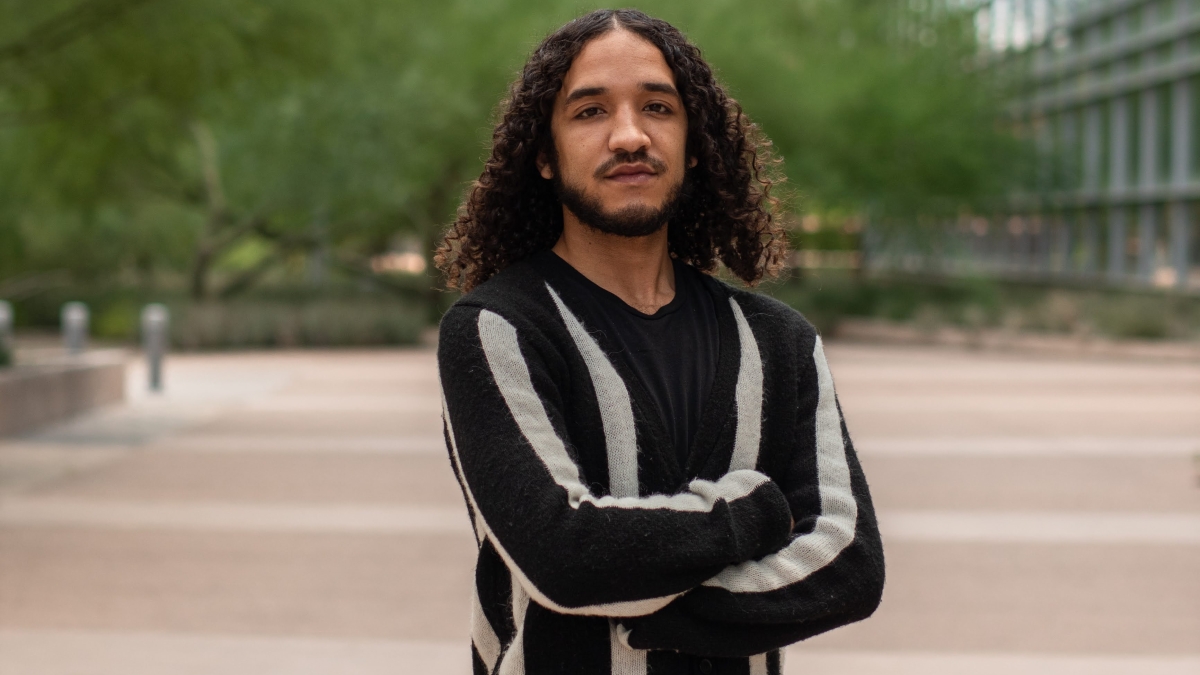Behavioral neuroscience grad student wins Knowledge Mobilization Award for mentorship

“I know that thinking about the next opportunity can be very difficult for undergraduates, as it was for me. And I would just like for students to understand that there are a lot of opportunities there for them, including graduate school, no matter their position in life,” said ASU psychology graduate student Dylan Peay.
This fall, graduate student Dylan Peay was announced as a recipient of the Graduate College Knowledge Mobilization Spotlight Award for his work in promoting and mentoring underrepresented students toward pursuing graduate school in neuroscience and psychology.
As an undergraduate, Peay didn’t believe that graduate school was an option for a student like him. He came from an economically disadvantaged background and didn’t think he was qualified to even attempt pursuing higher education. Fortunately, he learned from many mentors that he actually had a place. Their guidance led him to research and, ultimately, into his current doctoral program.
Peay’s research uses basic science models to test how chronic stress specifically impacts male but not female subjects. As part of Professor Cheryl Conrad’s Behavioral Neuroscience Research in Stress lab, Peay focuses on the neurobiology of chronic stress as well as the impacts that chronic stress has on learning and memory in the spatial domain.
“What got me interested in behavioral neuroscience was the opportunity to really understand the interactions between the brain and behavior,” said Peay. “With most research experiences, you only get one aspect, such as observing behavior, or you only get to perform experiments in a lab setting. Whereas, in behavioral neuroscience, we get to observe both an animal behaving and then correlate that with what we see in the brain.”
Peay and the Behavioral Neuroscience Research in Stress lab use chronic stress to model things such as depression and post-traumatic stress disorder, or PTSD. Their research is important in order to understand the mechanisms behind how stress influences brain plasticity and resilience.
“Overall, the stress response is crucial for survival, but when things go awry with the stress response, that can be problematic for everyday life,” said Peay.
Conrad said Peay stands out for his curiosity and desire to pursue research questions, as well as his love for teaching and mentoring students to be successful.
“When Dylan applied to graduate school, he impressed the committee by earning an educational certificate along with his other STEM degree,” said Conrad. “This showed us that his interest in helping others learn was one of his core values. As a scientist, significant findings are less impactful unless the information can be disseminated in a way that is understandable, and Dylan is very talented in explaining difficult concepts to others.”
Refocusing his mentorship goals
In 2020, Peay found himself contemplating the tension surrounding political and social events around the world, and it refocused his attention toward what is really important to him: being a good mentor to students who needed guidance. Additionally, he noticed there is a distinct lack of Black STEM professionals, and he wanted to be a strong example of an African American mentor in neuroscience.
“I know that thinking about the next opportunity can be very difficult for undergraduates, as it was for me. And I would just like for students to understand that there are a lot of opportunities there for them, including graduate school, no matter their position in life,” said Peay, who already has a secondary education teaching credential and considers his role as an educator a personal passion.
In the Behavioral Neuroscience Research in Stress lab, there are anywhere from eight to 10 undergraduate volunteers and researchers who play a crucial part in every experiment, both in running them and processing and coding data.
Peay helps to train them through behavioral processes and surgical procedures, and the students are often able to assist with publications in the lab. Many of these undergraduate students eventually pursue graduate school as a result of their experiences in the lab.
“Dylan is an excellent young scientist who works very hard, challenges himself and thinks about science using an approach that spans from the brain to its functions via behavior. He thinks critically so that he can do the very best science, always steps up to teach others and collaborate, and does it with sincerity and kindness,” said Heather Bimonte-Nelson, President’s Professor of Psychology and director of the Behavioral Neuroscience of Memory and Aging Lab.
“Dylan is an excellent role model, an inspiration to others and a testament to what resilience, hard work and a sharp mind can accomplish. We are so proud that he is in our program."
After the completion of his PhD, Peay is looking to join a postdoctoral fellowship opportunity that will help to expand his skill set and ensure that his research maintains its translational value to inform future interventions and treatment.
Video courtesy of Robert Ewing
More Science and technology

Lucy's lasting legacy: Donald Johanson reflects on the discovery of a lifetime
Fifty years ago, in the dusty hills of Hadar, Ethiopia, a young paleoanthropologist, Donald Johanson, discovered what would…

ASU and Deca Technologies selected to lead $100M SHIELD USA project to strengthen U.S. semiconductor packaging capabilities
The National Institute of Standards and Technology — part of the U.S. Department of Commerce — announced today that it plans to…

From food crops to cancer clinics: Lessons in extermination resistance
Just as crop-devouring insects evolve to resist pesticides, cancer cells can increase their lethality by developing resistance to…